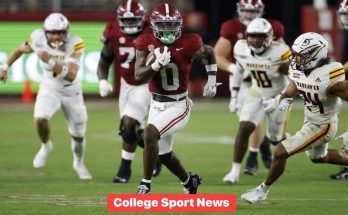The world of college football recruiting is a realm of fervent passion, intricate strategy, and life-altering decisions, a dynamic landscape where the futures of young athletes and the ambitions of storied programs intersect with breathtaking intensity. It is within this crucible of competition and aspiration that a recent announcement reverberated with particular significance, as Craig Tutt, a phenomenal four-star defensive back hailing from Murfreesboro, Tennessee, cast his lot with the Ole Miss Rebels, choosing them over a formidable array of collegiate powerhouses including his home-state Tennessee Volunteers and the ever-present Auburn Tigers, as confirmed by his declaration on Friday and reported by On3. This commitment is far more than a mere footnote in a recruiting cycle; it is a profound narrative, rich with implications for the athlete, the institution, and the broader competitive fabric of the Southeastern Conference (SEC).
Craig Tutt is not just another promising high school talent; he embodies the modern defensive back prototype, possessing a rare blend of athleticism, instinct, and versatility that has made him one of the most coveted prospects in the nation. Standing at approximately 6 feet tall and weighing around 180 pounds, he brings a physical readiness that belies his age, combined with a football IQ that allows him to read plays and react with remarkable precision. His classification as a four-star recruit underscores the high esteem in which he is held by scouting services across the country, with some outlets even placing him among the top 10 safeties in America. On3, a prominent voice in collegiate sports recruiting, further solidified his elite status by ranking him as the No. 9 safety and the No. 5 overall player in the deeply competitive state of Tennessee for the 2026 recruiting class. These rankings are not simply arbitrary numbers; they are a testament to his demonstrable skill set and the universal belief among evaluators that he possesses the raw talent and developmental potential to become a true game-changer at the collegiate level.
His journey to this pivotal decision was marked by a rigorous and exhaustive recruiting process, a whirlwind of visits, conversations, and considerations that saw him courted by virtually every major program seeking to bolster their defensive backfields. The fact that he narrowed his choices down to Ole Miss, Tennessee, and Auburn, all perennial contenders within the rugged SEC, speaks volumes about the caliber of the institutions vying for his commitment and the strategic importance of his position. For the Tennessee Volunteers, missing out on an in-state talent of Tutt’s magnitude is undoubtedly a blow, especially considering the ongoing efforts to retain top prospects within the Volunteer State. Similarly, Auburn, a program consistently battling for supremacy in the SEC West, saw their hopes for Tutt’s services dashed. Yet, it was Ole Miss that ultimately captured his allegiance, a victory that speaks to the efficacy of Lane Kiffin’s coaching staff and their compelling vision for Tutt’s future.
When pressed about his decision, Tutt consistently emphasized several key factors that set Ole Miss apart from its formidable competitors. Foremost among these was the program’s palpable sense of a “family-oriented culture.” In an era where recruiting battles are often decided by facilities, NIL opportunities, and projected NFL pathways, Tutt’s prioritization of genuine human connection and a supportive environment resonates deeply. He articulated how this family atmosphere was not merely a recruiting pitch but a lived reality he experienced during his visits to Oxford. He spoke of feeling a genuine welcome as soon as he stepped on campus, noting that it was “not a forced welcome” and that he could “feel welcome as soon as you walk through the door.” This emphasis on authentic relationships and a sense of belonging is a powerful draw for young athletes navigating the pressures of high-stakes collegiate sports. It suggests a program where personal well-being and camaraderie are as valued as on-field success, creating a holistic environment conducive to both athletic and personal growth.
Beyond the familial feel, the Ole Miss coaching staff’s clear and comprehensive plan for his development played a pivotal role in his decision. Tutt highlighted their ability to “develop you,” emphasizing that they are committed to “coach you, they’re going to love you and it’s just that culture. You never go wrong.” He found reassurance in speaking with current freshmen who affirmed that choosing Ole Miss was “the best decision they ever made,” seeing firsthand the tangible evidence of the program’s commitment to its players. This focus on development is crucial for any aspiring athlete, and for a defensive back like Tutt, whose game thrives on refinement and strategic deployment, it was particularly appealing. The coaches articulated a vision that leveraged his exceptional versatility, seeing him not just as a safety but as a dynamic asset capable of playing corner, the nickel spot, and both safety positions. This recognition of his multi-faceted skill set and a willingness to utilize him in various roles within Pete Golding’s flexible defensive system speaks to a sophisticated understanding of his talent and a tailored approach to his integration into the team. His ability to cover in space, be a factor against the run, and his decisive movements make him an ideal fit for a modern defense that demands adaptability and playmaking across the secondary.
Tutt’s impressive junior season at Oakland High School provides a compelling preview of the impact he is poised to make in Oxford. He showcased his extraordinary athleticism and versatility by accumulating nearly 2,000 all-purpose yards, a remarkable feat for a player primarily projected as a defensive back at the next level. His offensive contributions were equally staggering, as he rushed for 1,250 yards and scored 21 offensive touchdowns, demonstrating his ability to be a true two-way threat. On the defensive side, he recorded 64 total tackles, broke up seven passes, tallied three tackles for loss, and secured an interception, statistics that paint a picture of a player who consistently makes impactful plays. During Oakland’s dominant 42-20 championship victory over Houston, Tutt underscored his big-game potential by rushing for an 84-yard touchdown that effectively sealed the game, along with contributing three tackles and two pass breakups on defense. These performances are not flukes; they are consistent demonstrations of his high motor, innate playmaking ability, and a relentless drive to win, all qualities that will undoubtedly translate to the collegiate gridiron.
The commitment of Craig Tutt marks a significant triumph for Lane Kiffin and the Ole Miss Rebels, further solidifying their impressive 2026 recruiting class. His addition brings the total number of four-star prospects in the class to five, underscoring the program’s upward trajectory and its growing appeal to elite talent. Tutt is also the sixth defensive pledge for the Rebels in this class and currently stands as their only committed safety, highlighting the strategic importance of his recruitment in addressing a key position need. This victory in the recruiting trenches is a testament to the tireless efforts of the coaching staff, their ability to forge genuine connections with recruits, and their compelling vision for the program’s future. It also signifies Ole Miss’s increasing competitiveness against traditional SEC powerhouses for top-tier talent, a clear indication of their rising profile within the conference.
The reverberations of Tutt’s commitment extend beyond the immediate recruiting cycle, signaling a broader strategic success for Ole Miss. In the high-stakes world of SEC football, securing commitments from highly-rated defensive backs is paramount, given the league’s proliferation of explosive offenses and elite pass-catchers. Tutt’s multifaceted skill set, his ability to excel in both coverage and run support, and his potential to play multiple positions within the secondary provide defensive coordinator Pete Golding with a versatile weapon to deploy against the league’s diverse offensive schemes. This flexibility is increasingly valuable in modern football, allowing defenses to adapt and counter various offensive formations and personnel groupings. Tutt’s addition enhances the depth and talent of the Rebels’ defensive backfield, providing a crucial building block for sustained success.
Furthermore, Tutt’s commitment underscores the growing allure of the Ole Miss program under Lane Kiffin. Kiffin, known for his offensive innovation and engaging personality, has successfully cultivated an environment that attracts top recruits who are not only seeking a competitive football experience but also a supportive and development-focused one. The emphasis on honesty and authenticity in the recruiting process, as articulated by Tutt, reflects a refreshing approach that resonates with young athletes. He noted that the coaches were “honest with me, not trying to persuade me to come to a school,” and that they “want to work. They want to win. They want to win games and they care about you not just for football.” This holistic approach, prioritizing the athlete’s well-being beyond the football field, differentiates Ole Miss in a highly competitive landscape.
The broader implications of this commitment for college football recruiting are also worth exploring. In an era dominated by the transfer portal and Name, Image, and Likeness (NIL) deals, the traditional high school recruiting process remains a vital pipeline for programs to build sustainable success. Tutt’s decision highlights that while financial incentives and immediate playing time are important, factors such as coaching relationships, developmental pathways, and a genuine team culture continue to hold significant sway. His detailed explanations of why he chose Ole Miss provide valuable insights into the decision-making process of elite recruits, emphasizing the subjective and personal elements that often tip the scales. It serves as a reminder that for many young athletes, the opportunity to grow, be challenged, and belong to a cohesive unit outweighs purely transactional considerations.
Looking ahead, Craig Tutt’s arrival in Oxford is eagerly anticipated. He brings an explosive playmaking ability that promises to make an immediate impact on the field. His versatility will allow the coaching staff to strategically deploy him in various defensive alignments, creating mismatches and disrupting opposing offenses. As he transitions from high school to the collegiate level, Tutt will undoubtedly face new challenges, but his proven work ethic, natural talent, and the supportive environment he has chosen position him for significant success. The commitment also injects further momentum into Ole Miss’s recruiting efforts for the 2026 class, as elite commitments often have a ripple effect, attracting other high-caliber prospects to join the fold.
In conclusion, Craig Tutt’s commitment to Ole Miss is a landmark moment in the current recruiting cycle. It represents a significant win for the Rebels, strengthening their defensive backfield with a four-star talent who possesses both immediate impact potential and long-term developmental upside. His decision, rooted in a strong connection to the coaching staff, a belief in their developmental vision, and an appreciation for the program’s family-oriented culture, offers a compelling narrative in the ever-evolving world of college football. As the Murfreesboro native prepares to embark on his collegiate journey in Oxford, the anticipation for his contributions to the Ole Miss Rebels, and the indelible mark he is poised to leave on the SEC, can only grow. This is more than just a commitment; it is the beginning of a promising new chapter for a gifted athlete and a testament to the strategic prowess of a program on the rise.



